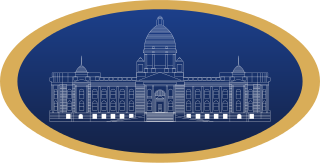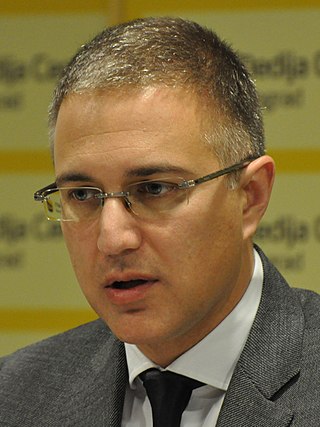
Serbia and Montenegro, known until 2003 as the Federal Republic of Yugoslavia, FR Yugoslavia or simply Yugoslavia, was a country in Southeast Europe located in the Balkans that existed from 1992 to 2006, following the breakup of the Socialist Federal Republic of Yugoslavia. The country bordered Hungary to the north, Romania to the northeast, Bulgaria to the southeast, North Macedonia to the south, Croatia and Bosnia and Herzegovina to the west, and Albania to the southwest. The state was founded on 27 April 1992 as a federation comprising the Republic of Serbia and the Republic of Montenegro. In February 2003, it was transformed from a federal republic to a political union until Montenegro seceded from the union in June 2006, leading to the full independence of both Serbia and Montenegro.
The New Democratic Party of Serbia is a national-conservative political party in Serbia.

The Government of Serbia, formally the Government of the Republic of Serbia, commonly abbreviated to Serbian Government, is the executive branch of government in Serbia.

The National Assembly is the unicameral legislature of Serbia. The assembly is composed of 250 deputies who are proportionally elected to four-year terms by secret ballot. The assembly elects a president (speaker) who presides over the sessions.

The Alliance of Vojvodina Hungarians is a regionalist political party in Serbia representing the Hungarian minority.

The Liberal Democratic Party is a liberal political party in Serbia. It is led by Čedomir Jovanović.

The Parliamentary Assembly of Bosnia and Herzegovina is the bicameral legislative body of Bosnia and Herzegovina. It consists of the following two chambers.

The Politics of Serbia are defined by a unitary parliamentary framework that is defined by the Constitution of Serbia in which the president, currently Aleksandar Vučić, is the head of state while the prime minister, currently Ana Brnabić, is the head of government. Executive power is exercised by the Serbian government and the President of Serbia. Legislative power is vested in the unicameral National Assembly which is composed of 250 proportionally elected deputies. The judiciary is independent and is headed by the Supreme Court of Cassation, which is also the highest court in Serbia.
The Party of United Pensioners, Farmers, and Proletarians of Serbia – Solidarity and Justice is a political party in Serbia that advocates for pensioners' interests.

The Autonomous Province of Kosovo and Metohija, commonly known as Kosovo and abbreviated to Kosmet or KiM, is an autonomous province defined by the Constitution of Serbia that occupies the southernmost part of Serbia. The territory is the subject of an ongoing political and territorial dispute between Republic of Serbia and the partially recognised, self-proclaimed Republic of Kosovo, the latter of which has control over the territory. Its claimed administrative capital and largest city is Pristina.

The Serbian Progressive Party has been the ruling political party of Serbia since 2012. Miloš Vučević has served as its president since 2023, succeeding Aleksandar Vučić, who served as the party's president from 2012 to 2023, and Tomislav Nikolić, the party's president from 2008 to 2012.

The president of the National Assembly of Serbia is the presiding officer of the National Assembly of Serbia. The president is elected by members of each new assembly for a term lasting four years

Nebojša Stefanović is a Serbian politician who served as deputy prime minister of Serbia from 2016 to 2022 and as minister of defence from 2020 to 2022. A member of the Serbian Progressive Party (SNS), he previously served as president of the National Assembly of Serbia from 2012 to 2014 and as minister of internal affairs from 2014 to 2020.
The Social Democratic Party is a centre-left political party in Serbia.
The Green Party was a political party in Serbia, based in Novi Sad. The party also represented the Slovak minority in Serbia.

Branko Ružić is a Serbian politician who served as the minister of education from 2020 to 2023. A member of the Socialist Party of Serbia (SPS), he previously served as minister without portfolio in charge of European Integration from 2013 to 2014, as minister of public administration and local self-government from 2017 to 2020, and as first deputy prime minister of Serbia from 2020 to 2022.

On 7 July 2020, a series of protests and riots began over the government announcement of the reimplementation of the curfew and the government's allegedly poor handling of the COVID-19 situation, as well as being a partial continuation of the "One of Five Million" movement. The initial demand of the protesters had been to cancel the planned reintroduction of curfew in Serbia during July, which was successfully achieved in less than 48 hours of the protest. The protesters also demanded a more technical response to the COVID-19 crisis and more factual and constructive information about the ongoing medical situation. Among other causes, the protests were driven by the crisis of democratic institutions under Aleksandar Vučić's rule and the growing concern that the President is concentrating all powers in his hands at the expense of the parliament.
Local elections were held in most cities and municipalities of Serbia on 21 June 2020, with repeat voting later taking place in some communities. The elections were held concurrently with the 2020 Serbian parliamentary election and the 2020 Vojvodina provincial election. Elections on all three levels were initially scheduled for 26 April 2020 but were rescheduled due to the COVID-19 pandemic in the country.














